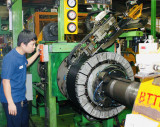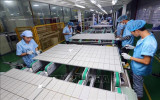Conditions in place for industrial production to rebound in 2024
Industrial production in Vietnam has shown signs of recovery and is believed to have a bright prospect in 2024 thanks to the global consumption rebound and support from the Government, ministries, and sectors.
The Ministry of Industry and Trade (MoIT) said that inflation is cooling in large economies like the US, China, and Europe, unsold inventory in foreign markets has gradually decreased. Positive signs have been recorded in imports from the world’s biggest economies, which are also leading trading partners of Vietnam. Vietnam is also believed to benefit from multinationals' shift of production away from China.
These factors will have positive impact on export activities, the MoIT noted.
Dao Phan Long, Chairman of the Vietnam Association of Mechanical Industry (VAMI), said developed nations are stepping up strategies to diversify supply sources, supply chains, and investment destinations, which will help the country become an important production and export centre of global value chains.
In addition, the sustained macro-economic and social stability will continue providing favourable conditions for investment attraction and production-business activities in the time ahead, he noted, adding that member businesses of VAMI are striving to further connect with partners from Japan, the Republic of Korea (RoK), and India to create prerequisites for production in 2024.
The MoIT said to assist enterprises, the Government has been working to boost public investment disbursement, an important growth driver, which will in turn help stimulate domestic demand and production-business activities. The active and comprehensive implementation of many policies to tackle production difficulties will also continue supporting firms to recover and develop.
Nguyen Van Doan, Deputy Director of mechanical engineering company SKD Vietnam, said that the market and production-business situations have improved much compared to the first half of 2023. However, challenges to the global economy are forecast to remain in 2024 due to weak growth, high inflation, tightened monetary policies, and geo-political tensions in many areas worldwide.
Vietnam has joined in many free trade agreements (FTAs), giving its economy great openness, so it is also prone to negative external impacts and risks, Doan pointed out, perceiving that businesses still need authorities’ measures to connect companies and address capital access and administrative procedure obstacles.
Echoing the view, Nguyen Van, Vice Chairman of the Hanoi Supporting Industries Business Association (HANSIBA), underlined the importance of access to capital, especially loans with low interest rates, for enterprises to recover and grasp opportunities this year. However, a relatively large number of companies haven’t been able to access credit.
Business-matching measures are also necessary to help them engage in global supply chains, he went on, noting that HANSIBA has organised many programmes to link its members with firms from the RoK, Japan, and India.
The MoIT said it will keep working to remove difficulties, facilitate production, assist domestic firms to take part in supply chains of foreign investors in Vietnam, and ensure optimal administrative procedures and credit access for companies, particularly small- and medium-sized ones, to recover and develop production./.
VNA
 Criteria of 2024 projected to early accomplishment
Criteria of 2024 projected to early accomplishment
 Import-export turnover reaches nearly US$53 billion
Import-export turnover reaches nearly US$53 billion
 Binh Duong vibrant with e-commerce week and super promotional month
Binh Duong vibrant with e-commerce week and super promotional month
 Training workshop on restructuring of industry and trade successfully organized
Training workshop on restructuring of industry and trade successfully organized
 Bank encourages checking transactions on applications
Bank encourages checking transactions on applications
 Ben Cat concentrates efforts to fulfill socio-economic development targets
Ben Cat concentrates efforts to fulfill socio-economic development targets
 Forstering a logistics center with regional connection
Forstering a logistics center with regional connection
 To clear bottlenecks, make good use of FTAs
To clear bottlenecks, make good use of FTAs
 Vietnam balances supply and demand to prepare for Tet shopping season
Vietnam balances supply and demand to prepare for Tet shopping season
 Developing Bac Tan Uyen district into a town in the period 2030-2040
Developing Bac Tan Uyen district into a town in the period 2030-2040







